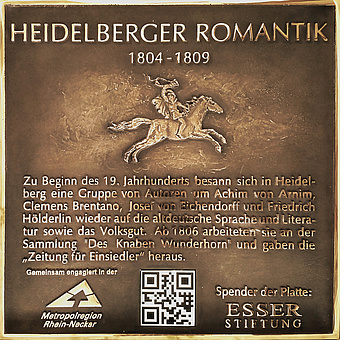1804-1809 Heidelberg Romanticism
Achim von Arnim, Clemens Brentano, Josef von Eichendorff, Friedrich Hölderlin
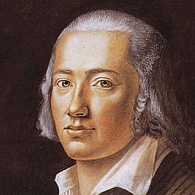
(Pastel by Franz Karl Hiemer, 1792)
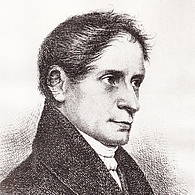
The beginning of the 19th century is a time of upheaval. The French Revolution, Napoleon's occupation of German lands, his sweeping reforms and also the beginning of industrialization evoke fears for the future. As a reaction to this people flee from the real problems and the rational way of thinking into a romantically transfigured German past. The everyday world is transformed into the mystical. Great importance is attached to the feelings, the freedom of the mind and the description of the idyll of nature.
At this time, a number of authors who lived in Heidelberg and who were inclined toward Romanticism founded the "Heidelberg Romanticism" movement. The lyricist Friedrich Hölderlin is one of the first to dedicate a poem to Heidelberg as a city of Romanticism. His famous Ode to Heidelberg was written shortly after the completion of the Old Bridge.
The classical philologist Friedrich Creuzer, a full professor at Heidelberg University since 1804, is one of its most respected professors. From the winter semester of 1806, Joseph Görres also taught in Heidelberg. Joseph von Eichendorf, who had come to Heidelberg with his brother Wilhelm to continue his studies, attended his lectures.
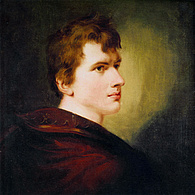
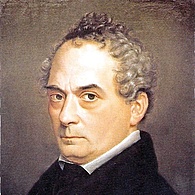
Eichendorff makes friends with Clemens Brentano and Achim von Arnim and is soon part of the Romantic intellectual movement. In his poem "Einzug in Heidelberg," one senses the attitude to life of "Heidelberg Romanticism. With the poem "In einem kühlen Grunde" he sets a poetic monument to his unhappy love and the small valley of Alt-Rohrbach.
The brothers Jacob and Wilhelm Grimm, Karoline von Günderrode and Bettina von Arnim were in close contact with these authors and, although they did not live in Heidelberg, they are therefore also counted among the Heidelberg Romantics. The most important representatives of Heidelberg Romanticism, however, are von Achim von Arnim and Clemens Brentano.
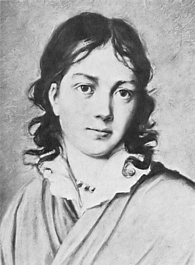
Born in Ehrenbreitstein in 1778 as the son of a merchant, Clemens Wenzeslaus Brentano de La Roche grows up with relatives at and attends changing educational institutions. In Heidelberg he attended a boarding school run by a former Jesuit, in Mannheim also a Christian school and in Koblenz together with Joseph Görres a Jesuit high school. After breaking off an apprenticeship as a merchant at his father's request, he tries his hand at various fields of study. In Jena, as a student of medicine, he made the acquaintance of a number of early Romantics, also had contact with Goethe, and began to devote himself more and more to his literary inclinations. When he began studying philosophy in Göttingen in 1801, he met Achim von Arnim, who was two and a half years younger and studying natural sciences there. Soon both are bound by a close friendship. They turn to literature and in 1802 take a trip together on the Rhine. Von Arnim also meets Bettina, his friend's sister. Nine years later she becomes his wife.
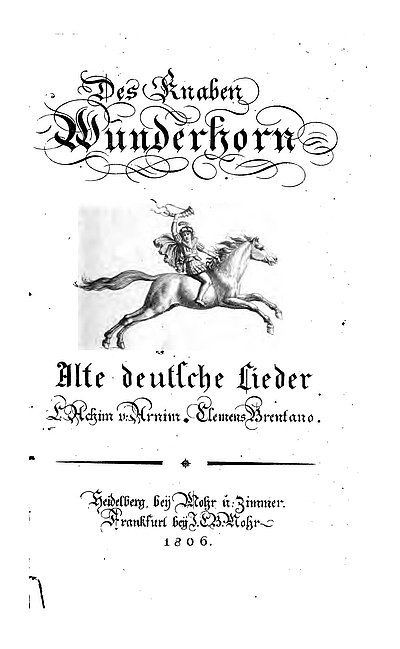
In 1804, Achim von Arnim returned from his educational travels and, together with Brentano, who now lived in Heidelberg, made plans to publish a collection of old German songs.
As a counter to Napoleon's foreign rule, they want to recall and revive the past national greatness . They were concerned with Germanic poetry, with fairy tales and legends, whose colloquial language and closeness to the people they appreciated. By recalling German culture, old German language and literature, they want to contribute to the renewal of national identity and thus to a united Germany. In doing so, the Heidelberg Romantics did not orient themselves on antiquity, as did the Jena Early Romantics, but on the Middle Ages and on German folklore. With the help of poetry that is close to the people, they strive to unify the torn nation. Therefore, it is important to them to write the texts in such a way that everyone can understand them.
Brentano and von Arnim publish the songs they have collected in a three-volume work they call "Des Knaben Wunderhorn". The first volume appears as early as the fall of 1805, but is predated to the year 1806.
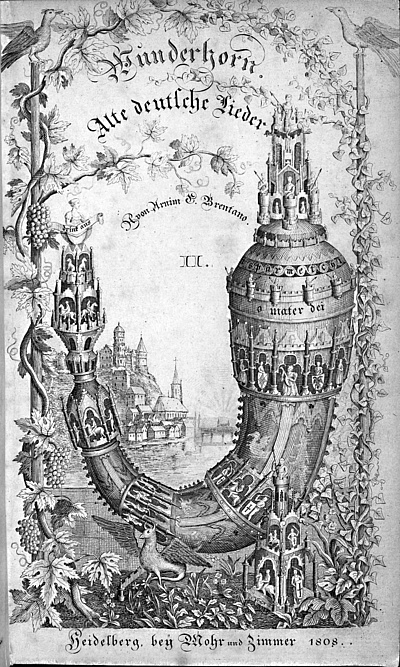
With the two subsequent volumes published in 1808, some of which were compiled together with the Brothers Grimm in Kassel, the collection comprises a total of 723 songs and is regarded as the main work of the "Heidelberg Romantic period". Although the collection of songs was not able to drive out Napoleon or bring about German unity, its great merit lies above all in saving German fairy tales, legends and songs from oblivion.
Although it is a collection of songs, Brentano and von Arnim publish the texts without sheet music. Perhaps this is why "Des Knaben Wunderhorn" later inspired so many composers to set the texts to music. For example, Johannes Brahms ("Guten Abend, gut' Nacht"), not to mention Gustav Mahler, who set a total of 24 of the "Wunderhorn songs" to music between 1892 and 1901. Also many folk songs such as "Bettelmanns Hochzeit", "Da oben auf dem Berge", "Ännchen von Tharau", "Bald gras' ich am Neckar" and the ever topical song "Die Gedanken sind frei" are still known today.
In the period from April 1 to August 30, 1808, Clemens Brentano and Achim von Arnim also published the "Zeitung für Einsiedler. Friedrich Hölderlin, Ludwig Uhland and Ludwig Tieck also contribute to . After 37 issues, however, the newspaper had to cease publication for financial reasons.
In April 1808, the Eichendorff brothers leave Heidelberg, and von Arnim also turns his back on Heidelberg the following November.
Thus, the heyday of "Heidelberg Romanticism" soon draws to a close.
Clemens Brentano
Song of a student arrival in Heidelberg
In his "Lied von eines Studenten Ankunft in Heidelberg" (Song of a Student's Arrival in Heidelberg) from 1806, Clemens Brentano is enthusiastic about the beautiful city and praises the Neckar and the Old Castle.
The Neckar rushes out of green halls
And gives a joyful sound on the rock,
The city stretches down the river,
With a lot of noise and sounds quite lively,
And above it on the green mountain breast,
The castle rests large and sees the pleasure,
And as I looked up to the sky,
I saw a work of God built,
From the king's chair to the holy mountain's back
I saw a golden bridge blown up,
I saw peace's rainbow arched
And saw it again in the river's waves
& nbsp;
Joseph von Eichendorff (c. 1810)
In a cool reason
The Kühle Grund is a small valley that leads up from Alt-Rohrbach eastward to the Boxberg - the former meadowland of the Rohrbach farmers. Even now you can still hear nightingales in the Kühle Grund. But the mill wheel sung about by Eichendorff unfortunately no longer exists.
In a cool ground
There goes a mill wheel
My love has disappeared,
Who lived there.
She promised me fidelity,
Gave me a ring with it,
She broke fidelity,
My ring broke in two.
I want to travel as a minstrel
Far out into the world,
And sing my songs,
And go from house to house.
I would like to fly as a horseman
Well into the bloody battle,
Around quiet fires lie
In the field at dark night.
I hear the mill wheel go:
I don't know what I want -
I'd like to die,
Then all at once it would be quiet!
Joseph von Eichendorff (1855)
Moving into Heidelberg
One of the works inwhich Joseph von Eichendorff recalls his student days in Heidelberg is "Einzug in Heidelberg".
But as they now turned around a rock,
there was suddenly a wonderful glow,
Church spires, fields, rocks and treetops were on fire,
And far into the colorful country
a stream of fire snaked its way with sparks,
as if the world were to burn up in the blaze of heaven.
Dazzled between hills of vines
They saw a city, covered with blossoms like snow,
In the clear stream dreamily reflected,
From light-dazzled forest solitude
High above river and city and hamlets
The ruins of an old castle pillar.
And as they reach the gate of the city,
The fountains rush into the alleys,
And shepherds sang far away from the mountains,
And merry companions serenaded at the fragrant waft
Of the gardens around in whimsical costumes
In front of their beloved doors.
Meanwhile the forest rustles with ancient tales,
And of the castle's battlements above the river,
Which tower as if from another time,
The castle ghost speaks his greeting every evening,
Blessing the city for many hundreds of years
And ship and boatmen who pass by.
Enchanted by this fairy tale
The wanderers stand still - Move on, whoever can!
So they had seen it in dreams,
And everyone looks at it like his home,
And the magic has not lied to anyone,
For Heidelberg was where they moved in.
Friedrich Hölderlin (1800)
Heidelberg Ode
Hölderlin's Heidelberg Ode was written in 1800, shortly after the completion of the Old Bridge.
Long have I loved thee, I would call thee, for my pleasure,
Mother, and give thee an artless song,
Thou, the fatherland's cities
Rurally fairest, as much as I saw.
As the bird of the forest flies over the peaks,
Swinging over the stream, where it shines past thee,
Light and strong the bridge,
Which sounds of chariots and men.
As if sent by gods, a spell once
On the bridge captivated me, as I passed by,
And into the mountains
The lovely distance seemed to me,
And the young man, the stream, moved away into the ebb,
Sadly joyful, as the heart, when it, itself too beautiful,
Loves to go down,
Throws itself into the floods of time.
Springs thou hadst given him, hadst given the fugitive
Cool shade, and the shores saw
All' after him, and it quivered
From the waves their lovely image.
But heavy in the valley hung the gigantic,
fateful castle down to the ground,
Torn apart by the weather;
But the eternal sun poured
Its rejuvenating light over the aging
giant image, and around it greened living
ivy; friendly forests
rustled down over the castle.
Shrubs blossomed down to where in the serene valley,
Leaning against the hill, or the shore hold,
Your merry lanes
Under fragrant gardens rest.


